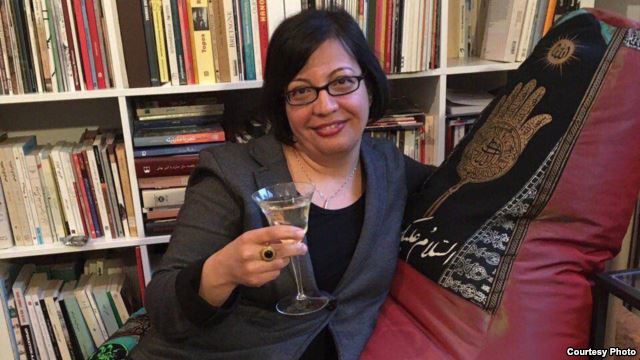'Islamic' Chair Cover Gets Iranian Activist In Trouble
Source: Radio Free Europe Radio Liberty
By Golnaz Esfandiari

A prominent Iranian human rights lawyer and women's rights activist has created a controversy by posting a picture on social media that shows her sitting on a chair with Islamic motifs while holding a glass of wine.
The chair in the photo of Shadi Sadr is covered with a material used in Iran for events marking the Ashura, the martyrdom of Imam Hossein, the grandson of the Prophet Muhammad. It is a work by Iranian artist Parastou Forouhar, whose parents were among intellectuals and political activists killed in the late 1990s by Intelligence Ministry agents.
Hard-line conservative Iranian media, including state-controlled television and the Fars news agency, which is affiliated with the Islamic Revolutionary Guards Corps (IRGC), accused Sadr of insulting Islamic sanctities and disrespecting Islamic values.
Sadr, one of many activists and intellectuals who had to flee Iran to escape imprisonment in a crackdown after the 2009 presidential elections, told RFE/RL that the photo was not insulting and that she posted the photo to highlight the plight of nonbelievers in Iran.
"Shadi Sadr, the fugitive feminist and a so-called journalist who supports women's rights, has entered her pro-Western orientation into a new phase: insulting values and the holiest of the holy symbols of the Iranian nation; the symbol of the mourning for [Imam Hossein]," a state television report said.
Fars called Sadr's picture "an excuse to insult religious sanctity," while accusing her of questioning Islamic principles for years.
The news agency posted a statement by "a group of professors and law experts" calling for Sadr's extradition, trial, and punishment over what it said was her "antireligious" move.
The statement said that according to Islamic penal law, those convicted of insulting sanctity and holy figures can be either sentenced to death or to one to five years in prison.
Sadr told RFE/RL that she posted the photo on social media to highlight what she saw an as "interesting contrast."
"I was sitting [with friends] and discussing Ashura practices and our memories and experiences from childhood when I realized the contrast between the [chair] I was sitting on, the material on it, and myself with that glass in hand. I asked someone who was there to take my picture," she said in a telephone interview from London, where she is based.
"I thought there's an interesting contrast in the picture where a woman without the hijab and full of joy is sitting on that chair. It represents the many freedoms those who are not believers have been deprived of in Iran in the name of [religion]. That's all," she added.
Sadr dismissed allegations that her picture was an insult to Islamic sanctity.
"As someone born in a Shi'a family, I think I'm familiar enough with that culture to know that there is nothing insulting in that picture," she said.
She added, "The material [that covers the chair] is not considered sanctity, nor there is any insult in that picture."
She said she believed the outrage among critics stemmed from the contrast she highlighted in the picture, which is rarely seen in Iranian society.
Sadr's picture on Instagram generated over 34,000 comments, including many threats and warnings.
"You insulted the beliefs of a large number of people. It is really deplorable," read a comment posted under Sadr's post.
Another said that he hoped Sadr's would be "punished" soon.
"You keep talking about human rights and the need other people's beliefs. How come you disrespect other people's beliefs while making such claims," another user commented.
Some praised Sadr for the post.
"What a wonderful picture, full of positive energy," one woman wrote, adding that those who were angered by it should learn "to relax."
Sadr said she'd been threatened with death and rape over her picture. "Most of the threats I received [over the post] were threats of rape, [many] left obscene comments while defending holy figures," she said.
Some described in detail how they would rape Sadr if they would lay their hands on her.
Sadr's post was removed from Instagram on May 31. She said she hadn't received any notification from Instagram about the reason for the move.
Instagram has not yet responded to an RFE/RL inquiry about the removal of Sadr's post. The picture is still available on Sadr's Facebook page.
UPDATE: Sadr's photo is now available on Instagram after being temporarily removed. “We removed this image by mistake and we apologize for the inconvenience caused. We worked to rectify this as soon as we were notified and have already taken steps to prevent this from happening in the future,” an Instagram spokesperson told RFE/RL in an e-mail.


